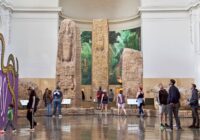The history of human civilization is a story of movement, adaptation and exchange. From our ancestors’ first migrations out of Africa to today’s interconnected global economy, progress has always been driven by diversity, trade and innovation. Recent genetic research underscores a striking reality: Omniconnectivity — the interconnection of humans across multiple domains (biological, cultural and economic) — is not just a modern phenomenon; it’s embedded in our DNA. The same forces that enabled Homo sapiens to thrive in a changing world continue to shape economic and geopolitical success today.
Homo sapiens emerged in Africa around 300,000 years ago, but it was their outward-oriented nature — their willingness to migrate, intermix and adapt — that set them apart. Unlike Neanderthals and Denisovans, who remained in small, isolated populations, early humans ventured beyond familiar terrain, interbreeding with these archaic species and acquiring beneficial genetic traits. Neanderthal DNA, for example, strengthened immune systems, while Denisovan genes helped Tibetans survive at high altitudes. This evolutionary advantage, gained through openness rather than isolation, mirrors the economic realities of a seamless global link. Just as genetic diversity enhances resilience, economic interconnectedness fosters innovation, efficiency and long-term prosperity.
Cultural cooperation, not nationalism, advanced human civilization
For centuries, trade has been the lifeblood of economic expansion. The Silk Road, trans-Saharan networks and maritime trade routes of the past were the arteries through which ideas, goods and technologies flowed. These exchanges not only facilitated commerce but also enriched cultures and advanced societies. The transmission of agricultural techniques, financial instruments and scientific knowledge across continents, such as the spread of Islamic mathematics to Renaissance Europe, demonstrates that human advancement has always depended on interconnectedness. The economic parallels to genetic exchange are undeniable.
In the 15th through 17th centuries, the Age of Exploration reshaped global trade and accelerated cultural and genetic mixing on an unprecedented scale. European colonial expansions, while often marred by conflict and exploitation, also created new economic systems that facilitated technological diffusion and economic growth. Today, capital and talent flow across borders much like human populations did thousands of years ago, creating hubs of innovation in finance, technology and industry. The world’s most dynamic economies — from Silicon Valley to Singapore — are those that embrace diversity, investment and global talent.
Yet despite the historical evidence, political and economic nationalism are on the rise. Trade barriers, restrictive immigration policies and economic decoupling threaten to reverse the very mechanisms that have driven human success. The economic risks of isolationism mirror those of genetic bottlenecks: Just as inbreeding weakens biological resilience, protectionism stifles economic adaptability. Societies that close themselves off to global engagement risk stagnation, while those that embrace openness continue to evolve and prosper.
Take the United States, for example. It became a global powerhouse not by economic insularity but by welcoming capital, talent and trade. Immigration and openness to diverse cultures have historically played a crucial role in fostering innovation and economic dynamism, as seen in the rich diversity of talent in US cities. This pattern holds true in business as well. Companies that engage with global markets gain a competitive edge by accessing international expertise and supply chains, while those that retreat into domestic protectionism risk long-term decline.
Progress requires omniconnectivity
One group cannot solve the defining challenges of the 21st century — climate change, poverty and technological competition — in isolation. Just as early humans adapted through migration and exchange, modern economies must leverage cosmopolitan convergence to remain competitive. Addressing climate change, for instance, requires multinational cooperation and technological innovation shared across borders. Similarly, supply chain resilience depends on diversified global networks rather than insular policies. Whether through digital trade, multinational partnerships or scientific collaboration, humanity needs omniconnectivity to flourish. The principle remains the same: Survival and success belong to those who embrace openness, not retreat from it.
Moreover, innovation thrives in diverse environments. The cross-pollination of ideas has led to historic breakthroughs in science, medicine and industry. Anthropologist Chris Stringer highlights how early Homo sapiens succeeded in part due to their ability to integrate knowledge from different groups, a concept that remains relevant in today’s knowledge-driven economy. Countries and companies that cultivate diverse talent pools and cross-cultural collaboration position themselves for long-term success.
Reclaiming the soul of globalization
Caritas in Veritate stands as one of the most incisive examinations of economic globalization in recent decades. Notably, Pope Benedict XVI’s vision is far from ideological, eschewing both market absolutism and state worship. Instead, he advocates for an economy grounded in ethics, solidarity and the common good. His analysis targets not globalization per se, but its dominant form, which prioritizes profit absolutism, technocratic rationality and human dignity’s disregard. For Pope Benedict, this model embodies not just inequality but a profound spiritual disfigurement, a globalization that has forsaken its soul.
The moral perspective also resonates with Nobel laureate George Akerlof’s work. Through behavioral economics, Akerlof reveals how unregulated markets exploit human vulnerability, a phenomenon he aptly terms, “phishing for phools.” Akerlof dispels the myth of ethically neutral markets, cautioning that economic activity divorced from moral foundations fosters manipulation and undermines social trust.
Omniconnectivity is not just an economic trend — it is a fundamental part of who we are. The history of Homo sapiens teaches us that progress is driven by connection, not isolation. As the world navigates an era of geopolitical and economic uncertainty, policymakers and business leaders would do well to remember that resilience lies in engagement, not withdrawal. Our DNA tells the story of planetary synergy. It is up to us to continue it.
[Lee Thompson-Kolar edited this piece.]
The views expressed in this article are the author’s own and do not necessarily reflect Fair Observer’s editorial policy.
Support Fair Observer
We rely on your support for our independence, diversity and quality.
For more than 10 years, Fair Observer has been free, fair and independent. No billionaire owns us, no advertisers control us. We are a reader-supported nonprofit. Unlike many other publications, we keep our content free for readers regardless of where they live or whether they can afford to pay. We have no paywalls and no ads.
In the post-truth era of fake news, echo chambers and filter bubbles, we publish a plurality of perspectives from around the world. Anyone can publish with us, but everyone goes through a rigorous editorial process. So, you get fact-checked, well-reasoned content instead of noise.
We publish 2,500+ voices from 90+ countries. We also conduct education and training programs
on subjects ranging from digital media and journalism to writing and critical thinking. This
doesn’t come cheap. Servers, editors, trainers and web developers cost
money.
Please consider supporting us on a regular basis as a recurring donor or a
sustaining member.
Will you support FO’s journalism?
We rely on your support for our independence, diversity and quality.







Comment